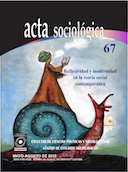Modernity, reflexivity and postnormal science in risk society
Main Article Content
Abstract
This article aims to show the main proposals of Ulrich Beck about how the technological risks function in the context of the so-called second modernity, in order to expose their implications in terms of new forms of reflexivity in complex societies. We analyze the relationship between reflexivity, scientific knowledge and epistemological pluralism to understand how technological risks, posed with an increasing force, question the authority of science, therefore leading to new areas of organiza- tion, conducive to claim various groups excluded from public discussions on scientific and technological matters. In this paper, we try to provide some important elements for analysis of current problems regarding the risks and dangers technologically produced, allowing us to locate different forms of reflexivity in contemporary social environments. Therefore, we want to show the validity of the main tenets offered on the sociology of risk and the theory of reflexive modernity in relation to notions proposed by CTS studies in philosophy of science; specifically based on the approach of post-normal science raised by Silvio Functowicz and Jerome Ravetz, who problematize, like Beck, reflective political dimension of technological risks; however, he does it with a more epistemological emphasis which appears to an interdisciplinary and dialogical horizon concerning knowledge of the risk. Making this junction between both perspectives, allow us in our view, to understand the relevance of the contributions of the sociology of risk and expand their thoughtful routes in relation to other social philosophical fields.
